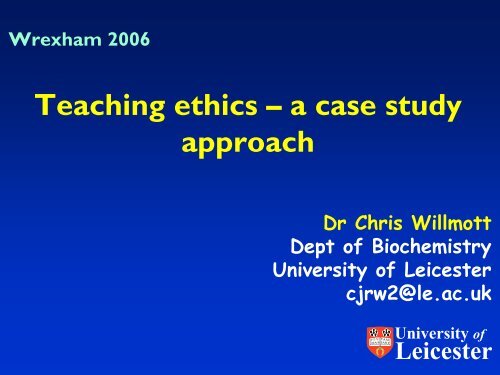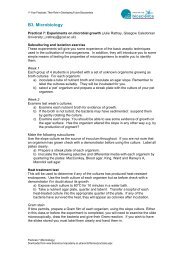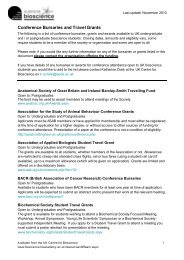Teaching ethics – a case study approach - Centre for Bioscience ...
Teaching ethics – a case study approach - Centre for Bioscience ...
Teaching ethics – a case study approach - Centre for Bioscience ...
Create successful ePaper yourself
Turn your PDF publications into a flip-book with our unique Google optimized e-Paper software.
Wrexham 2006<br />
<strong>Teaching</strong> <strong>ethics</strong> <strong>–</strong> a <strong>case</strong> <strong>study</strong><br />
<strong>approach</strong><br />
Dr Chris Willmott<br />
Dept of Biochemistry<br />
University of Leicester<br />
cjrw2@le.ac.uk<br />
University of<br />
Leicester
Approaches<br />
• Case studies/ scenarios<br />
• Debate and role-play<br />
• Newspapers<br />
• TV programmes, inc. Structured activity based on<br />
news footage<br />
• Clips from other programmes<br />
• Knowing what’s on and when<br />
University of<br />
Leicester
Case studies & scenarios<br />
• Case studies allow real-world framing of<br />
otherwise abstract ideas<br />
• As such, can have a key role in opening up<br />
complex issues <strong>for</strong> students<br />
• May be genuine or fictional (though latter work<br />
best when as close to real as possible)<br />
University of<br />
Leicester
Case <strong>study</strong> (1) <strong>–</strong> Carl and Julie<br />
Carl is a twenty-one year old builder. He is engaged to Julie,<br />
and she has recently discovered that she is expecting their<br />
first child. In 2001, Carl’s maternal grandfather died from<br />
Huntington’s disease (HD), a late-onset degenerative disease<br />
of the nervous system. HD is inherited in a dominant fashion;<br />
if you do have HD, you have a 50% chance of passing it on to<br />
your children. Carl’s mum has decided not to take the test to<br />
find out if she got the faulty copy from her father, but now<br />
that he is expecting to be a father himself, Carl is keen to find<br />
out if there is any risk that he has passed on the condition.<br />
What are some of the issues at stake <strong>for</strong> Carl and Julie? What<br />
are the consequences of taking the test, or deciding not to?<br />
If you were Carl, what would you do?<br />
University of<br />
Leicester
Genetic screening<br />
Carl can know his status and prepare<br />
accordingly<br />
But his mum has made a conscious decision<br />
not to know, hence potential harm to her<br />
Other consequences:<br />
- Carl’s relationship with Julie?<br />
- Carl’s relationship with baby?<br />
- Implications <strong>for</strong> Carl’s work?<br />
- Insurance implications, etc<br />
(Developed from episode of “Bitter Inheritance”)<br />
University of<br />
Leicester
Case Study (2) <strong>–</strong> Pig-Heart Boy<br />
Get one of the students to read out a short section of<br />
“Pig-Heart Boy” by Malorie Blackman,<br />
e.g. First three pages of Chapter 3<br />
Good starter <strong>for</strong> ethical issues,<br />
move on to discuss the science<br />
University of<br />
Leicester
Case <strong>study</strong> (3) <strong>–</strong> Wendy & Paul<br />
Wendy and Paul Carter have been married <strong>for</strong> twelve years. They would<br />
love to have children. Un<strong>for</strong>tunately, Wendy had breast cancer when<br />
she was 28 and although the chemotherapy has brought total<br />
remission from the disease it also caused damage to her ovaries that<br />
has made her infertile.<br />
Paul and Wendy have been on the waiting list at their local IVF clinic <strong>for</strong><br />
a number of months awaiting donated eggs to try and have a baby.<br />
At present, however, there are 200 potential mothers seeking each<br />
donated egg and the couple know that realistically they may never<br />
receive a donated egg via the normal channels.<br />
Researchers at the hospital attached to the IVF clinic have recently<br />
gained permission to carry out experimental procedures using eggs<br />
harvested from aborted foetuses. The technique is controversial, but<br />
<strong>for</strong> Paul and Wendy it may represent their only chance to receive a<br />
donated egg.<br />
University of<br />
Leicester
Case <strong>study</strong> (3) <strong>–</strong> Wendy & Paul<br />
What are the issues involved in this <strong>case</strong>?<br />
- Feel free to include aspects of the <strong>case</strong> that are<br />
likely to be issues <strong>for</strong> other people, your<br />
contributions need not be limited to your own<br />
opinions.<br />
University of<br />
Leicester
Case <strong>study</strong> (3) <strong>–</strong> Wendy & Paul<br />
• This <strong>case</strong><br />
- content is fictional but based on real ideas<br />
and statistics<br />
- used in Session 1 of 6 in bio<strong>ethics</strong> series<br />
- used as vehicle to introduce more<br />
philosophical aspects<br />
University of<br />
Leicester
Case <strong>study</strong> (3) <strong>–</strong> example comments<br />
Deontological (first principles)<br />
• Does a foetus have any rights?<br />
• Does the “mother” have any rights or say in the<br />
upbringing of their “grandchild”?<br />
• Should people be allowed to manipulate nature <strong>for</strong><br />
their own gain?<br />
Consequentialist (outcomes)<br />
• What would be the psychological effects on the<br />
child?<br />
• If the child turns out to be “defective” then who is<br />
culpable?<br />
• What is the likelihood of success?<br />
University of<br />
Leicester
Making ethical decisions<br />
Principles of Biomedical Ethics (Beauchamp &<br />
Childress) propose 4 principles:<br />
1. Non-maleficence Don’t do harm<br />
2. Beneficience Do good, act in the best<br />
interests of others<br />
3. Autonomy Maximise freedom <strong>for</strong> individual<br />
or community<br />
4. Justice Treat equal <strong>case</strong>s equally and<br />
unequal <strong>case</strong>s differently
Genetic screening<br />
Carl can know his status and prepare<br />
accordingly (Autonomy, Beneficience)<br />
But his mum has made a conscious decision<br />
not to know, hence potential harm to her<br />
Other consequences:<br />
- Carl’s relationship with Julie?<br />
- Carl’s relationship with baby?<br />
- Implications <strong>for</strong> Carl’s work?<br />
- Insurance implications, etc<br />
(Adapted from episode from series “Bitter Inheritance”)<br />
University of<br />
Leicester
Use of the rain<strong>for</strong>est<br />
• UN Conference on Environment and Development<br />
• Roles, representatives of:<br />
- Government in country<br />
- A logging company<br />
- Indigenous <strong>for</strong>est-dwellers<br />
- Subsistence farmers in the area<br />
- Cattle ranchers<br />
- A multinational chemical company<br />
- UN commission on Sustainable Development<br />
Southgate (2002)<br />
University of<br />
Leicester
Other suitable role-play scenarios<br />
• Pre-implantation Genetic Diagnosis - “Saviour sibling”<br />
•Roles, e.g.:<br />
- specialist doctor<br />
-sick child<br />
- parents<br />
- genetic counsellor<br />
- pro-life campaigner<br />
• Task set, might be:<br />
Write scientifically accurate sketch (as team), or<br />
Research role ready <strong>for</strong> improvised TV show<br />
University of<br />
Leicester
Role-play: limitations<br />
• Unlikely to have roles <strong>for</strong> all members of the class<br />
• Can partly be avoided by giving a non-playing ‘role’<br />
to the majority, e.g. as <strong>ethics</strong> committee members<br />
or conference delegates who need to make decision<br />
<strong>–</strong> involved in debate<br />
• Doesn’t work well “off the cuff”<br />
<strong>–</strong> need script and/or time to prepare<br />
University of<br />
Leicester
TV footage <strong>–</strong> why?<br />
• Familiar visual medium<br />
• Can be used to:<br />
- convey in<strong>for</strong>mation<br />
- as discussion starters<br />
• Clips save time over full programme<br />
University of<br />
Leicester
What sort of programmes?<br />
• Horizon, e.g.<br />
- Who’s afraid of designer babies? (2005)<br />
- The world’s first face transplant (2006)<br />
• Drama documentaries, e.g.<br />
- Born with two mothers (Channel 4, 2005)<br />
• Other drama, e.g.<br />
- The Simpsons (e.g. Trash of the Titans)<br />
- The family man (BBC1, 2006)<br />
•News clips<br />
-topical<br />
- pithy summary<br />
University of<br />
Leicester
Holby City (BBC1, 6 th Sept 2006)<br />
• Pete has kidney failure and is being offered the last<br />
opportunity of a transplant, using a kidney from a pig<br />
•What ethical objections might some people have<br />
about this operation?<br />
•What scientific difficulties might there concerning an<br />
operation of this sort?<br />
• If you were Pete’s friend would you suggest that he<br />
accepts the doctor’s offer? Why/why not?<br />
University of<br />
Leicester
Xenotransplantation<br />
Example comments include:<br />
• “He’s going to die anyway, so why not give it a try”<br />
•“Yuk!”<br />
• “What about animal rights?”<br />
These comments are brought into discussion at<br />
relevant point in subsequent discussion<br />
University of<br />
Leicester
What is xenotransplantation?<br />
• Transplantation of animal cells, tissues or organs<br />
into another species<br />
• Also called xenografting<br />
• Source animals considered <strong>for</strong> transplants to humans<br />
• Baboons<br />
•Pigs<br />
• Xenotransplantation of organs is NOT possible at<br />
present<br />
University of<br />
Leicester
Arguments <strong>for</strong> xenotransplantation<br />
• There is a persistent and increasing shortage of<br />
human donor organs <strong>for</strong> transplantation<br />
• People are dying on the waiting lists<br />
• Organs currently become available unexpectedly<br />
(e.g. RTA) <strong>–</strong> xenotransplantation would allow<br />
proper planning of operations<br />
• Animal cells, hormones, heart valves etc are already<br />
used <strong>–</strong> what’s the difference?<br />
• The patient is going to die anyway<br />
<strong>–</strong> why not give it a try?<br />
University of<br />
Leicester
Ethical arguments against<br />
• “Yuk factor”<br />
•Animal welfare<br />
• Economic arguments<br />
• Psychological factors<br />
• Genetic modification<br />
University of<br />
Leicester
Scientific arguments against<br />
• Three significant scientific problems<br />
• Immunological<br />
• Physiological<br />
• Risk of infection<br />
University of<br />
Leicester
Immunological problems<br />
• The body’s immune system is designed to fight<br />
“<strong>for</strong>eign” material<br />
• At least three processes can contribute to rejection<br />
of a xenograft<br />
• Hyperacute rejection (HAR)<br />
• Acute vascular rejection (AVR)<br />
• Chronic rejection<br />
University of<br />
Leicester
Physiological problems<br />
• Hard to <strong>study</strong> due to rejection issues<br />
• Although similar in size, pig and human hearts work<br />
in different sites, at different blood pressures and<br />
temperatures<br />
• The heart is a relatively simple organ, other organs<br />
are much more complex, esp. liver<br />
• “The physiology of transplanted cells is likely to<br />
present a significant obstacle to the successful<br />
implementation of xenotransplantation”<br />
Dobson & Dark (2002)<br />
report on behalf of UKXIRA<br />
University of<br />
Leicester
Infection risks<br />
• Risk of interspecies infection via xenograft<br />
• Would be risk not only to patient, but also to family<br />
and wider community<br />
• Risk assessment is there<strong>for</strong>e more complex than<br />
“He’ll die without it, so we may as well try”<br />
• Particular concern over PERVs<br />
Porcine endogenous retroviruses<br />
University of<br />
Leicester
Knowing what’s on and when<br />
For scheduled programmes:<br />
• Radio Times, etc<br />
• www.trilt.ac.uk<br />
Television and Radio Index <strong>for</strong> Learning and <strong>Teaching</strong><br />
University of<br />
Leicester
Knowing what’s on and when<br />
For scheduled programmes:<br />
• Radio Times, etc<br />
• www.trilt.ac.uk<br />
Television and Radio Index <strong>for</strong> Learning and <strong>Teaching</strong><br />
• www.tvgenius.co.uk<br />
But, news is not known in advance<br />
• Today programme (Radio 4)<br />
• BBC website, esp. Health and<br />
Science/Nature sub-sections<br />
University of<br />
Leicester
Getting hold of programmes & clips<br />
• Off-Air Recordings<br />
- recorded at time of transmission<br />
- requires Educational Recording Agency licence<br />
•Back-up www.bufvc.ac.uk/services/offair.html<br />
British Universities Film & Video Council<br />
University of<br />
Leicester
Using News stories in <strong>Bioscience</strong><br />
• Think of as many ways as possible that you might link one<br />
or more of the following news stories to your teaching of:<br />
(a) basic bioscience and/or<br />
(b) bio<strong>ethics</strong>?<br />
Hwang cloning<br />
scandal<br />
TGN1412<br />
drug trial<br />
Face transplant<br />
Images from http://news.bbc.co.uk/
Face transplants<br />
Technical<br />
Availability of donor face?<br />
Functionality of transplant?<br />
Plan B if rejected?<br />
Psychological<br />
For patient?<br />
For potential patients?<br />
For wider society?<br />
Face and identity?<br />
Immunological<br />
Ethical<br />
Risks v Benefits<br />
Motivation?<br />
Lifestyle issues<br />
Media intervention?<br />
Cancer risk?<br />
Rejection rates?<br />
(30-50% over first 2-5 yrs)<br />
Harmful effects of immunosuppressive drugs?<br />
Images from http://news.bbc.co.uk/
Face transplants<br />
http://www.bbc.co.uk/sn/tvradio/programmes/horizon/broadband/tx/faces/vote/
TGN1412 Drug trial<br />
Design of<br />
clinical trials<br />
Phases of a trial<br />
Science of this trial<br />
What are monoclonal<br />
antibodies?<br />
What are T lymphocytes?<br />
What are CD28 markers?<br />
Regulation of<br />
clinical trials<br />
Role of the MHRA?<br />
Role of <strong>ethics</strong> committees?<br />
Recruitment of volunteers?<br />
Location of trial?<br />
Liability?<br />
Use of animals in research<br />
Is this an example of the<br />
weakness or animal models?<br />
Would there be lots more<br />
disasters without animal expts?<br />
Images from http://news.bbc.co.uk/
Hwang cloning scandal<br />
Science of<br />
stem cells<br />
Ethics of stem<br />
cells research<br />
Therapeutic cloning<br />
Fraud<br />
Research <strong>ethics</strong><br />
Peer review and publication<br />
Images from http://news.bbc.co.uk/
Helpful websites<br />
e.g. www.bio<strong>ethics</strong>bytes.wordpress.com
Helpful websites<br />
e.g. www.beep.ac.uk
Helpful websites<br />
e.g. www.at-bristol.org.uk/cz/Default.htm
References<br />
• Blackman M. (1997) Pig-Heart Boy, Corgi Books<br />
• Southgate C. (2002) The use of the rain<strong>for</strong>est as a test <strong>case</strong> in environmental <strong>ethics</strong>, in<br />
Bio<strong>ethics</strong> <strong>for</strong> Scientists (Ed: Bryant, Baggott la Velle and Searle)<br />
• Willmott C. (2004) Ethics and Bio<strong>ethics</strong> Bio<strong>ethics</strong> Briefing No. 1 (LTSN/ Higher Education<br />
Academy <strong>Centre</strong> <strong>for</strong> <strong>Bioscience</strong>), available online at<br />
http://www.bioscience.heacademy.ac.uk/resources/<strong>ethics</strong>brief.htm<br />
University of<br />
Leicester




